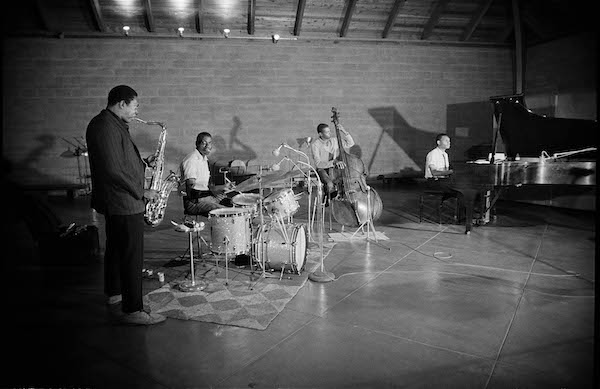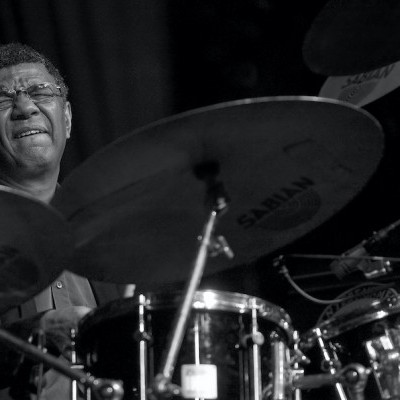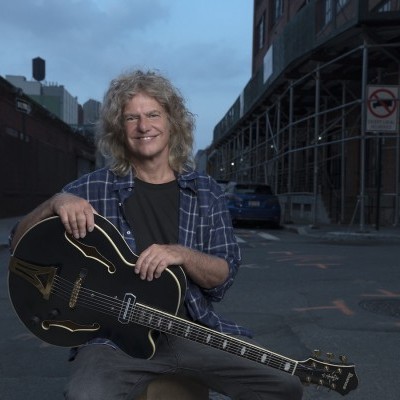Oct 28, 2025 10:47 AM
In Memoriam: Jack DeJohnette, 1942–2025
Jack DeJohnette, a bold and resourceful drummer and NEA Jazz Master who forged a unique vocabulary on the kit over his…

On June 29, the Impulse! label will issue previously unreleased studio recordings by John Coltrane (left), Elvin Jones, Jimmy Garrison and McCoy Tyner under the title Both Directions At Once: The Lost Album.
(Photo: © Jim Marshall Photography LLC)“Finding unreleased John Coltrane? It’s like discovering buried treasure.”
That’s how Ravi Coltrane, the late jazz icon’s saxophone-playing son, feels about the release of Both Directions At Once: The Lost Album (Impulse!). This isn’t an air-check, concert performance or collection of outtakes from existing albums. What we have here are 14 studio performances, all recorded on the same day—March 6, 1963—by famed recording engineer Rudy Van Gelder at his Englewood Cliffs, New Jersey, studio, with the classic lineup of Coltrane on tenor and soprano, McCoy Tyner on piano, Jimmy Garrison on bass and Elvin Jones on drums.
Even better, the song selection offers fresh insight into the way that quartet developed and grew. For instance, there’s an early, piano-less take on “Nature Boy” that’s quite different in character and approach than the version, recorded almost two years later, that would end up on The John Coltrane Quartet Plays.
There are four takes of “Impressions,” each of which is strikingly unique in terms of tempo and approach, with Tyner sitting out on the last two. There are three untitled originals, and not only does the set offer “One Up One Down” as a studio recording, it gives us two takes of it.
Basically, this is a Coltrane fan’s fantasy come true.
Both Directions At Once will be released in two versions. One will be a seven-track single disc, with one take each of the tunes Coltrane and company cut that day (Ravi Coltrane and Universal Music’s Ken Druker chose the takes and set the order). There will also be a deluxe edition with a second disc that includes seven alternate takes.
Of course, given how deeply the body of Coltrane recordings has been mined over the last five or six decades, it’s worth wondering how an entire album’s worth got made and then somehow lost. The recording date has been noted in several discographies (although incompletely), and one of the 14 tracks—a lithe, swinging soprano saxophone rendition of a tune from Franz Lehár’s The Merry Widow—turned up as “Vilia” on the 1965 Impulse! anthology The Definitive Jazz Scene, Vol. 3.
Judging from the liner notes (by Ravi Coltrane and Impulse! Records scholar Ashley Khan), these recordings fell between the cracks for three reasons. First, Coltrane and company were back at Van Gelder’s studio the very next day to record what would become the classic album with singer Johnny Hartman. This was a much more mainstream project and would likely have been seen by the label as a better way to broaden Coltrane’s appeal than releasing another instrumental quartet album.
Second, Coltrane’s producer at Impulse!, Bob Thiele (1922–’96), was in the habit of recording the saxophonist far more frequently than his label bosses would have liked. “I was always over budget with Coltrane,” Thiele said in a 1995 interview quoted in the liner notes. “I was finally told, ‘You can’t just keep recording this guy. We’ll never get these albums out.’ Thank God, I did it.”
Indeed, if Thiele hadn’t followed his instincts, many of the great Coltrane albums that were released after the saxophonist’s death in 1967—for instance, Sun Ship, First Meditations (For Quartet) or Interstellar Space—would never have existed.
But the third reason the tracks on Both Directions At Once almost disappeared was corporate stinginess and shortsightedness. After Impulse! moved its operations to the West Coast in 1967, the label’s collection of master recordings was put into storage. By the early ’70s, ABC’s fortunes began to wane, and label executives began to institute cost-cutting “efficiencies,” which included disposing of any stored master tapes for recordings that had never been issued. So the masters from these sessions probably were dumped in the garbage.
Luckily, Rudy Van Gelder also made session tapes—seven-inch mono reels recorded simultaneously with the master tapes—which he gave to the artists. Ravi, whose mother was Alice Coltrane, explained that the source for Both Directions was a tape that had been held by the relatives of Juanita Naima Coltrane (John’s first wife).
“You’d finish a record date at Rudy Van Gelder’s, and he would hand you reel-to-reel tapes for you to review,” Ravi said. “The tapes were in the possession of my father’s first wife’s family. We have many session reels ourselves that made it to John and Alice’s home when they got together. But this is a recording from ’63, so my father was still with Naima at the time, and her family held on to several of these tapes.”

Jack DeJohnette boasted a musical resume that was as long as it was fearsome.
Oct 28, 2025 10:47 AM
Jack DeJohnette, a bold and resourceful drummer and NEA Jazz Master who forged a unique vocabulary on the kit over his…

“Think of all the creative people I’m going to meet and a whole other way of thinking about music and a challenge of singing completely different material than I would have sung otherwise to my highest level in dedication to the moment,” Elling says about his Broadway run.
Sep 9, 2025 1:18 PM
Kurt Elling was back at home in Chicago, grabbing some family time in a late-June window between gigs. Sporting a smile…

Pat Metheny will perform with his Side-Eye III ensemble at Big Ears 2026 in Knoxville, Tennessee, next March.
Sep 9, 2025 12:19 PM
Big Ears has announced the lineup for its 2026 festival, which will take place March 26–29 and include 250…

“[That’s] the thing of the beboppers,” Bradford said. “These guys were important for not only playing that wonderful music, but they knew a sort of social stance, you see?”
Sep 9, 2025 1:07 PM
It was a calm, balmy, near-perfect evening in Westwood, California, not far from UCLA, in the expansive courtyard at…

Esperanza Spalding closed an audacious Chicago Jazz Festival set with “Endangered Species.”
Sep 9, 2025 11:50 AM
The 45th Chicago Jazz Festival kicked off its headline events with two erudite individuals, Esperanza Spalding and…